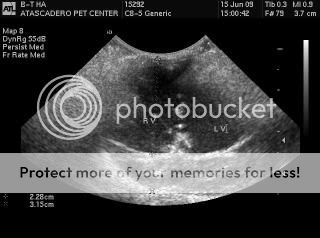VeganSoprano, an MRI probably wouldn't give you a definitive answer--you'd probably need a biopsy. You might see some changes on MRI, but they'd be non-specific.
Remember that in neurological cases, the clinical signs are related to WHERE the problem is. Different parts of the nervous system control different things. So, if you have a lesion in, say, your optic nerve, your clinical signs are going to be different (blindness) than if you have a lesion in your sciatic nerve (dropped hock, etc).
Therefore, what you describe as "just like cerebellar hypoplasia" are actually signs related to disease of the cerebellum. (All of the signs others with kitties who have CH are describing are what we call "cerebellar signs"--not "cerebellar hypoplasia signs.") In any given cat, the cerebellum (or any part of the brain) can be affected by infection/developmental issues/metabolic problems/tumor/trauma/toxin/etc and still come up with the same clinical signs. In YOUR cat, sounds like it was the early infection that probably exhibited tropism for the cerebellum (a lot of these viruses really like to hang out in that part of the body, especially in the young ones) and your cat fought it off and now has scars (or whatever you want to call it) on her cerebellum.
As a former head neuro tech (for one of the neurologists at the practice VeganSoprano works at, if I'm correct!

), I think this is a common point of confusion. The neuro exam tells you WHERE, it does not tell you WHAT. Once you figure out WHERE in the nervous system the lesion(s) is by doing a thorough neurological exam, you can begin to figure out WHAT the problem is. And there are a few ways we can look. An MRI is great for looking at certain things, but because your cat isn't actively sick with whatever caused the problem in the first place and because MRIs can't look microscopically, you'd likely see some "gee whiz" changes in the cerebellum and not be able to tell for sure WHAT is going on there. A spinal tap at the time of infection might have shown organisms or inflammation, but now that the kitty's recovered, would be unremarkable. So, you'll probably never know...but FWIW, I think your theory is correct and I'd definitely not waste the money on a scan!!!

Okay, off my soapbox and totally didn't mean to single you out, VeganSoprano--the wording in your post and the posts of others made me feel like it should be brought up to avoid confusion amongst folks reading this--I just think the whole "what you see tells you where, not what" thing is very very commonly confused, even amongst veterinarians.
Hope that's at least a little informative.

P.S. Hydrocephalus isn't very treatable, but it depends on the cause of the hydrocephalus. The domey head and buggy eyes definitely suggest a mucopolysaccharidosis to me--FWIW--again, not a doctor!!! and haven't seen many because the defect is really really rare--but it matches pictures in our pathology book, too. (Which you guys will see soon in school!) Of course, a mucopolysaccharidosis/lysosomal storage disease could cause hydrocephalus--maybe that's why the domed head in those guys?? Interesting! They're so rare that we're still learning about them.



 ) so I want to give him a fair idea of what adopting her will be like. Your 'genetic disaster' sounds like an awesome kitty -- do you know if there will be any long lasting effects from his hips? It just sounds so amazing
) so I want to give him a fair idea of what adopting her will be like. Your 'genetic disaster' sounds like an awesome kitty -- do you know if there will be any long lasting effects from his hips? It just sounds so amazing 




